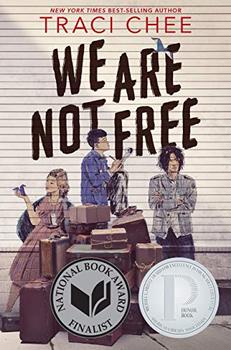Summary | Excerpt | Reading Guide | Reviews | Beyond the Book | Readalikes | Genres & Themes | Author Bio

I'm not a great artist or anything, but I'm a better artist than that. When I draw the people in my neighborhood, I draw them with eyes like crescent moons and kindness and red bean cakes split down the center. I draw them with real noses and regular-size teeth. If someone is out looking for a Japanese spy and they think a Japanese spy looks like the guy from the Sutro's ad, they'll never find him.
After the attack, the chimneys in Japantown bloomed with smoke. In the living room, Mom dug into her trunks and began feeding heirlooms into the fireplace, starting with the Japanese flag. I remember her kneeling by the hearth, plump hands folded in her lap, watching the flames obliterate the white sky, the red sun. Next, she burned letters from relatives I'd never met; Jii-chan's Imperial Army uniform, smelling of mothballs; and a woodblock print of ancestral warriors I used to study for hours (the armor, the ferocious eyes, the wild, battle-blown hair). They looked nothing like me, in my denim and button-downs.
Mas tried to stop her (some of the things she was burning belonged to Dad), but she didn't stop.
"I'm not a citizen," she told him. "If they think I'm disloyal, they'll take me away like Oishi-san."
Mr. Oishi, Shig's girl Yum-yum's dad, is a businessman with contacts in Japan. The FBI whisked him away the night of the bombing like a piece of litter.
He and Mom are what the government calls "enemy aliens."
We call them Issei. They're the first generation of Japanese immigrants to come to the United States, but they've never been allowed to become naturalized citizens.
That night, I sat on our stoop and drew the Japantown skyline with storm-colored flowers rising from the rooftops, dispersing ash like seeds on the wind.
Studying my reflection in the drugstore window, I put my fingers to the corners of my eyes, pulling upward to see if I can make myself look like the guy from the flyer. (I can't.) Behind me, there's the sound of heels clicking on the sidewalk, and two white women in polo coats, hats, and little suede gloves pass, staring with round blue eyes like binocular lenses, and I remember to keep walking.
As I pass beneath the Spanish tile roofs and honeycomb windows of the Jewish Community Center, I almost kick myself for forgetting again. I should've waited at the bus stop. In my head, I hear Mas's voice again—Think, Minnow—deep and gruff like if he was forced to say a kind word, he'd choke on it.
Excerpted from We Are Not Free by Traci Chee. Copyright © 2020 by Traci Chee. Excerpted by permission of Houghton Mifflin Books For Younger Readers. All rights reserved. No part of this excerpt may be reproduced or reprinted without permission in writing from the publisher.




The worst thing about reading new books...
Click Here to find out who said this, as well as discovering other famous literary quotes!
Your guide toexceptional books
BookBrowse seeks out and recommends the best in contemporary fiction and nonfiction—books that not only engage and entertain but also deepen our understanding of ourselves and the world around us.